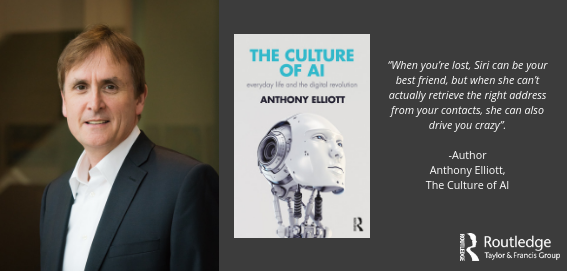Adrift in today’s sea of AI

Anthony Elliott
New book looks at the possibilities and perils of the digital revolution of AI
The invasion of robots has long been predicted, but – according to a new book by Cambridge-trained sociologist Anthony Elliott – AI is not so much the future as a revolution already well underway, albeit one which is unfolding in complex and uneven ways across the globe.
From the rise of chatbots and AI-powered personal assistants such as Siri and Alexa to AI TV-news anchors, AI is our here-and-now. Alongside new technologies of machine learning and smart algorithms, AI pervades our professional and personal lives. AI deeply impacts our lives, loves, hopes and dreams. AI changes social relations in the deepest sense.
“When you’re lost, Siri can be your best friend, but when she can’t actually retrieve the right address from your contacts, she can also drive you crazy” says Professor Elliott,
“The idea that you could become so frustrated with what is, in effect, a complex algorithm was practically inconceivable 10 years ago”, says Prof. Elliott.
“Just like electricity, AI is largely invisible and will soon be ubiquitous.”
“It functions automatically, operating behind the scenes, opening airport doors, navigating your car through unknown streets, reminding you of your daily appointments and often providing that online customer care support that you thought was handled by a real person.”
Professor Elliott, a Fellow of Academy of the Social Sciences in Australia, is Executive Director of the Hawke EU Jean Monnet Centre of Excellence at the University of South Australia. The Centre, which encompasses a Jean Monnet Network which Elliott heads as part of a global consortium of universities, addresses the grand challenge of how the digital revolution – AI, advanced robotics and accelerating automation – is increasingly transforming large tracts of social, economic and political life today.
AI’s Social disruption
Prof Elliott says while the march of AI will herald massive socio-economic disruption and the disappearance of some jobs, like most social transformations, some jobs will be enhanced by the technologies and new work will be created.
“But this revolution is testing us in other ways – it is changing how people talk and communicate with each other because it is blurring the lines of what is human to human communication.”
“More than 60 per cent of Internet traffic is now generated by machine-to-machine communication, conversation generated by chatbots and softbots.”
“Advanced AI is very different from previous forms of technological automation – these new technologies are increasingly mobile, situationally-aware, adaptive and in communication with other intelligent machines.”
“On a global scale, our future in an intensive AI world offers stunning new opportunities but also disturbing risks.
“The key question is whether our societies can tolerate the uncertainty of the culture of AI, react creatively to it, and become more open to constantly evolving digital transformation.”
Contribution to the debate
The Culture of AI, Professor Elliott’s 19th book published by Routledge, has received glowing praise from Lord Anthony Giddens, a member of the House of Lords Committee on AI.
According to Lord Giddens, the book is a “a unique and original contribution to the debate about AI now unfolding across the world. Rather than offering an exercise in futurology, Elliott provides a detailed and sophisticated analysis of the impact of AI and the digital revolution in the here and now.”
About Professor Anthony Elliott:
Anthony Elliott is Executive Director of the Hawke EU Jean Monnet Centre of Excellence and Jean Monnet Network at the University of South Australia, where he is Research Professor of Sociology and Chancellery Dean of External Engagement. He is Super-Global Professor of Sociology (Visiting) at Keio University, Japan, and Visiting Professor of Sociology at UCD, Ireland.
Professor Elliott studied at the Universities of Melbourne and Cambridge, where he was supervised by Lord Anthony Giddens. He was previously Professor of Sociology at the University of Kent at Canterbury, UK and was Associate Deputy Vice-Chancellor at Flinders University, Australia. Professor Elliott is a Fellow of the Academy of the Social Sciences in Australia, a Fellow of the Cambridge Commonwealth Trust, and a member of King’s College, Cambridge.
He is the author and editor of some 40 books, which have been translated or are forthcoming in 17 languages. His recent books include Identity (4 volumes), Contemporary Social Theory: An Introduction, The New Individualism (with Charles Lemert), Mobile Lives (with John Urry), On Society (with Bryan S. Turner), Reinvention, and Identity Troubles. His new book, The Culture of AI, will be published by Routledge later this year.
Find out more about Anthony Elliott and his work by visiting his website http://www.anthonyelliott.org/